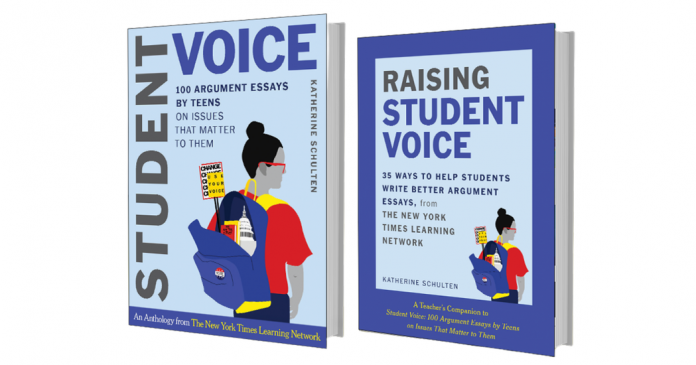Kabby Hong, an English teacher in Wisconsin, shows his students how essays like “In Three and a Half Hours, an Alarm Will Go Off,” a 2015 contest winner, not only make a tight argument, but do so with voice and style. He says the varied verbs in the first paragraph alone — “drag,” “plop” and “dive” — inspire his students to be more thoughtful about their own word choices.
Dawn Viles, an English teacher in Tennessee, uses the essays to encourage students who think they have nothing to say. She shows them the wide array of topics winners have taken on in the past, and says that her class found “I’m a Disabled Teenager, and Social Media Is My Lifeline” particularly compelling this year.
And Christa Forster, an English teacher in Houston, pairs the work of winners with literature to make themes like “taking a stand” more accessible and concrete. Essays like “The Red Stain on Society,” “Breaking the Blue Wall of Silence,” and “Confronting Toxicity in Gaming” recently had her sophomores “chattering energetically” in virtual breakout rooms about the sentences they found interesting, risky and moving, she says.
If you, too, are a teacher who has taught with the work of any of the previous winners of our Student Editorial Contest — or if you are a student who has learned from them — we invite you to tell us what worked and why.
And if you’ve never used these essays as mentor texts, this is an invitation to try it and see what happens.
We hope to publish your ideas next month, both to kick off our Eighth Annual Student Editorial Contest, which runs from Feb. 23-April 13, and to celebrate the publication of the first-ever Learning Network books, a collection of over 100 of these short essays and a companion teacher’s guide that make using them easy.
The book “Student Voice” gathers evergreen, winning essays from 2014-20 all in one place, and categorizes them by subjects like “Teenage Life Online,” “Gender and Sexuality” and “Sports and Gaming.” The teacher’s guide contains practical strategies from the Times Opinion section and from more than a dozen educators who teach with our contest. It also includes helpful additions like a “Topic Generator” for students, a list of writing prompts and an index to some of the successful rhetorical moves these student writers have made.
Our aim is to show teenagers a variety of ways students their own age have made effective and powerful arguments that grew out of their real-life experiences and interests — playing tackle football, taking selfies and shopping for shoes, as well as fighting racial, religious, gender and ableist stereotypes. But our most important goal in putting together this collection? To convince any kids who pick up the book that they, too, have something important to say.
However you get access to them, let us know what you’ve used, and how and why you’ve used them, by filling out the form below. We’d love to hear from teachers and from students, so please spread the word!
If you need help, below the form we’ve listed a few questions — some for educators and some for students — that might spur brainstorming.
Educators
Have you used any of the essays by previous winners of this contest to:
Encourage them to make their own voices heard?
Pair with other works or topics you are teaching?
Demonstrate to them that there are as many ways to write evidence-based opinion pieces as there are writers of those pieces?
Or, have you use these essays in some other way?
If you have used the essays, tell us what’s worked best. If you haven’t, this is an invitation to experiment and tell us what happens.
Students
Have you used any of the work of the winners as inspiration, whether you found it yourself or a teacher assigned it?
Did another student’s topic help you figure out what you’d like to write about or what topics you’d want to avoid?
Have you admired or even borrowed any “writer’s moves” from a piece — whether that “move” was crafting an opening line, introducing evidence, weaving in a first-person point of view, or anything else, no matter how small?
Have you used any of these essays in any other way? Please let us know.
Students must be 13 and older in the United States and the United Kingdom, or 16 and older elsewhere, to submit.









